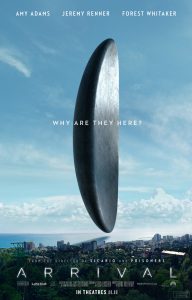Amy Adams starrer Arrival gets ahead of Interstellar as my film of choice because it’s complex without being confusing. An adaptation of Ted Chiang’s sci-fi short story, Story of Your Life, the only element holding the movie back is Johann Johannsson’s rather disruptive soundtrack. Louise Banks, played by Amy, is a linguist called upon to communicate with the beings in one of the 12 spacecrafts that descends across the world. The big question is “What is your purpose on Earth?”. Will she be able to decode their language before one of the other world powers take offensive action? Time has the answer.
Amy Adams is the force that holds this movie together. The casting is spot on. But sadly, there is not another woman of import in the cast. And all I could think of was how the outcome of the situation would have been different if it were being handled by more women. Why is combat our first response? Why are we hostile with the other? Why can’t there be a narrative where the resolution is complex but without violence? Considering the times we live in, Arrival comes as a reminder of human ability for destruction — of self and others.

The aliens in the spacecraft are seven-limbed “heptapods” that communicate in a circular language across a glass-like surface. They look like their parents were a giant octopus and an elephant. Why should more intelligent life forms have appendages or vaguely identifiable human/animal forms? Why should they have a written language? Why should they use their “arms” to write? Especially with science fiction, we are limited by our imagination. We need to imagine what life forms are out there but also present them in a form that the audience understands. Especially in a medium like flim, communication is restricted by the audience’s shared perception of imagery. If indeed aliens communicated via echolocation or ultrasonic sound, it wouldn’t make for an entertaining movie.
It’s interesting that it blows our mind that time is not linear. One of the alternatives is that it’s spherical. Meaning that though time has dimension, all time is accounted for. Which is why one of the most common sci-fi narratives is around the inability to change the past or how changing the future would change the past. And because time is already accounted for, this is not considered possible. If time were a line, it would be interspersed with situations and options. For every situation we make a decision to choose an option. Dinner or movie; water, wine or whisky; white, red, blue or yellow. Based on what we choose Time changes course. Don’t we all often think about the What Ifs? What if I had chosen dinner over the movie? I wouldn’t be writing this blogpost. Now imagine, what if you could see into future consequences of all your decisions before making each choice? You could build your future, quite literally. Today we make decisions blindly and call it fate or luck depending on how it turns out. If we were evolved enough to see Time as a whole, we would see that time is not linear or spherical but infinite.
If there are more intelligent life forms outside our planet, they ought to believe in the power of community. They are only a part of the whole. And the whole is always better than the sum of its parts. Why else would they need to get in touch with humans? I think greed is the hubris that makes humans territorial. We want to own more, control more without realising that we are an inconsequential part of a whole. We become significant only when we act in tandem with the whole. The sooner we recognise our place in the universe, the faster we will grow as a species.